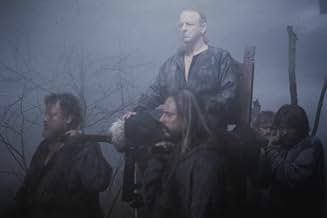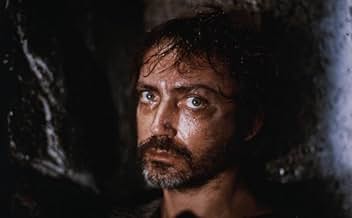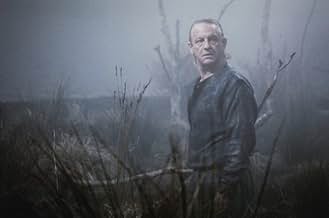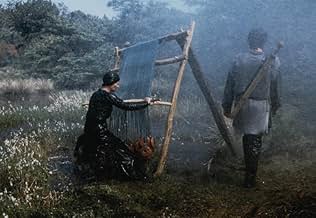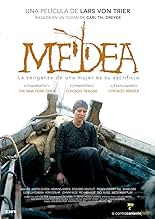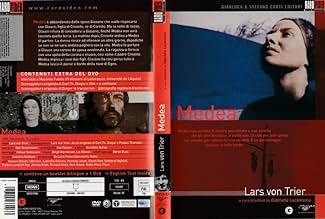Medea
- Fernsehfilm
- 1988
- 1 Std. 17 Min.
Füge eine Handlung in deiner Sprache hinzuMedea is in Corinth with Jason and their two young sons. King Kreon wants to reward Jason for his exploits: he gives the hand of his daughter, Glauce, to Jason as well as the promise of the ... Alles lesenMedea is in Corinth with Jason and their two young sons. King Kreon wants to reward Jason for his exploits: he gives the hand of his daughter, Glauce, to Jason as well as the promise of the throne. In exchange, Medea and the boys are to be banished. Jason explains that his action... Alles lesenMedea is in Corinth with Jason and their two young sons. King Kreon wants to reward Jason for his exploits: he gives the hand of his daughter, Glauce, to Jason as well as the promise of the throne. In exchange, Medea and the boys are to be banished. Jason explains that his actions ensure a rich future for Medea and her sons. She asks that she be allowed to stay; Kreon... Alles lesen
Empfohlene Bewertungen
But there are really few makers who can consistently furnish the sunsets, and link between them, that reveal something of planets in their orbits. Tarkovsky is king of that close vision from faraway. Watching this makes me lament Trier, because he could have been our current Tarkovsky, much more than either Tarr or Kusturica, who both flirted with carrying the mantle of that cosmogonic art.
This one lacks that orbital vision in different narrative planes (we only have one thread), and is mostly, rapturously devoted to tone poetry of elemental intimacy. It was very early in Trier's career anyway, but it's still a better and more visual third film than most directors ever managed. It's beautiful, but not in the clean sense of a David Lean epic. I prefer it this way.
That is partly because he's working from a barebones story that is ancient myth as interpreted by Euripides (and written into a script by Carl Dreyer): Medea has fled to Corinth promised marriage by the Argonaut Jason, who reneges on that promise when offered the hand of the daughter of the local king. Medea together with her two children is banished from the city.
It is a simple story of injustice. You are going to anticipate every turn, including (probably) the most tragic finale. It is the conventional Medea of myth, betrayed mother, woman, vengeful enchantress of cthonic witchcraft.
But the visual bell boom of this Rublev stretches far and wide, as he rings into being a gauzy world of untime, last fires, and first voyages out to cloudy sea. If only he hadn't lost himself in anger and cynical pessimism.. Tarr has followed suit. I think about the only thing that can keep an intelligent mind sane, is finding rhyme and music in unreason.
The cinematography is ground-breaking, and at times it's hard to figure out exactly how the images are being filmed. Sometimes it appears that the film was shot, then filmed again off of a television screen. That's not to say that the images aren't beautiful and breathtaking, just that they're a little unorthodox.
I won't go into the storyline, as you can read the synopsis above, but rest assured, if you're a film buff who truly appreciates a fluid film that rewards the eyes, mind, ears, and heart, this film will leave you very satisfied.
On the other hand, if you're a high school girl who is more interested in checking the text messages on her cell phone than watching the required film in class, then you'd better go down to the multi-plex real quick.
Medea is very much trapped in an imposed psychology, as are we all. The gods are pulling all the strings, or so it seems. She is not callous, not mechanical in killing her children, but tortured as she does fate's bidding. The children are part of the same system and must play their role in honouring their mother's agony. The tragedy is in the passive resignation. Trier communicates this far better than Pasolini, who communicated next to nothing in his version. We're watching someone plumb the very abyss of misery on account of simple vanity. That has always been worth some reflection.
This is the definitive Medea. Lars Triers deserves praise for bringing this tragedy into focus. For making Medea human instead of a monster he deserves our gratitude.
Wusstest du schon
- WissenswertesLudmila Glinska's only film role. She plays 'Glauce' and is credited as Ludmilla Glinska.
- VerbindungenFeatured in Tod eines Weltstars (1992)
Top-Auswahl
Details
Box Office
- Bruttoertrag in den USA und Kanada
- 16.714 $
- Eröffnungswochenende in den USA und in Kanada
- 2.379 $
- 20. Apr. 2003
- Weltweiter Bruttoertrag
- 16.714 $
Zu dieser Seite beitragen


